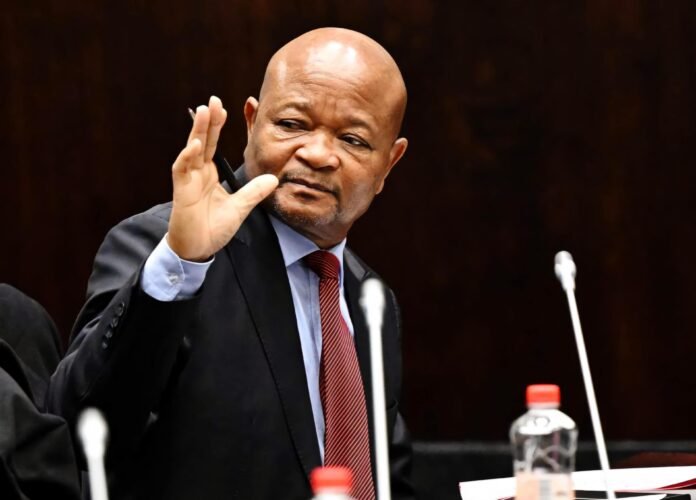In a nationally televised address on Sunday evening, President Cyril Ramaphosa announced the establishment of a judicial commission of inquiry into explosive allegations of criminal syndicate infiltration within South Africa’s law enforcement and justice systems. He also placed Police Minister Senzo Mchunu on immediate leave.
“Last Sunday, the 6th of July 2025, Lt Gen Lt Gen Nhlanhla Mkhwanazi, the KwaZulu-Natal Provincial Commissioner of the South African Police Service, held a media briefing in which he made public serious allegations about the existence and operation of a sophisticated criminal syndicate that has allegedly infiltrated law enforcement and intelligence structures in South Africa,” Ramaphosa said.
“Lt Gen Mkhwanazi alleged that the Minister of Police allegedly interfered with sensitive police investigations and colluded with business people, including a murder accused, to disband the Political Killings Task Team based in KwaZulu-Natal.”
The remarks were in response to a series of serious claims made by Mkhwanazi earlier this month, in which he described a dangerous entanglement of politicians, drug cartels, and judicial figures working to compromise state investigations. The issue has since escalated, shaking the public’s trust in the South African Police Service.
Commission to probe deep-rooted criminal infiltration
Ramaphosa announced that Acting Deputy Chief Justice Mbuyiseli Madlanga will chair the Commission, joined by Advocate Sesi Baloyi SC and Advocate Sandile Khumalo SC.
“The Commission will investigate allegations relating to the infiltration of law enforcement, intelligence and associated institutions within the criminal justice system by criminal syndicates.”
Its sweeping mandate includes:
- Suppression or manipulation of investigations
- Criminal complicity by SAPS, NPA, SSA, Judiciary and Metro Police
- Failure to act on intelligence
- Financial or political benefit from syndicate operations
The Commission will also explore whether current or former senior officials, including members of the National Executive, were complicit in enabling these operations.
“It will make findings and recommendations for criminal prosecutions, disciplinary actions and institutional reform.”
Mchunu sidelined, Cachalia appointed acting Police Minister
To ensure the independence of the inquiry, Ramaphosa announced that Senzo Mchunu would take a leave of absence, while Professor Firoz Cachalia—a former Gauteng MEC and current law professor—will step in as Acting Minister of Police from August.
“The Minister has undertaken to give his full cooperation to the Commission to enable it to do its work.”
An acting minister from within Cabinet will be appointed temporarily until Prof. Cachalia assumes his duties.
A Backdrop of escalating police tensions
Ramaphosa’s decision follows mounting internal SAPS friction. Just days ago, Deputy Commissioner Shadrack Sibiya accused Mkhwanazi of obstructing the investigation into the murder of rapper AKA.
Sibiya claimed Mkhwanazi “didn’t want to arrest” anyone linked to the case, forcing him to personally intervene. The remarks contrasted sharply with Mkhwanazi’s earlier public statements detailing arrests and strategy.
“We must protect the integrity of law enforcement”
“These allegations, if proven true, threaten to undermine the confidence of South Africans in the ability of the South African Police Service to protect them and to effectively fight crime and corruption.”
Ramaphosa emphasized that the Commission will have the authority to recommend urgent suspensions, prosecutions, and structural reforms based on the evidence it gathers. Interim reports will be submitted at 3 and 6 months, with a final report delivered to the National Assembly and Chief Justice.
“We are affirming our commitment to the rule of law, to transparency and accountability, and to building a South Africa in which all people are safe and secure.”

